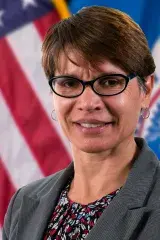Guest post by Helen Mearns, Deputy Director of the Chemical Security Analysis Center (CSAC) in the Science and Technology Directorate’s (S&T) Office of National Laboratories.

To commemorate International Day of Women and Girls in Science, I was invited to answer questions about my work tutoring and mentoring women and girls in my community and how I promote careers in science. For background, I have more than 25 years of scientific and technical expertise in chemical hazard survivability. As a member of CSAC’s leadership team—and as a woman blazing trails in my field—I feel a vital responsibility to make sure not only that CSAC maintains the talent and capabilities necessary to support the homeland security mission, but that we serve as an example for other agencies to follow. For me, it is important for women and girls to be heard, to support one another, and to pursue scientific interests as far as our aspirations can take us.
Following is how I answered some of the questions presented to me:
Why did you decide to become a mentor in STEM—Science, Technology, Engineering and Math?
Prior to coming to the Department of Homeland Security, I worked for the Department of Defense. In support of my work in Defense Acquisition and to augment my engineering degree, I was required to take business classes. My professors asked me to help other students. This grew into my involvement with my local community college—Harford Community College—where I have been a learning assistant for more than 20 years. Years later, as a result of the stay-at-home mandates during the COVID pandemic, elementary schools in my area reached out to local churches for assistance in the summer to help students prepare for the coming school year. My first year helping little ones was in 2021 and it was a little nerve wracking, but that age group is so honest that I quickly got over myself.
What are the ages of the girls you mentor?
All ages. Elementary school 7-10 years old, and teenagers, young adults and women.
Briefly describe your activities as a mentor.
I have found that listening to people is the skill that serves me best. Sometimes girls are shy and sometimes young adults and women have put themselves down for so long with negative self-talk that they barely speak above a whisper. I do my best to put them at ease. Learning is a process. I reassure them that mistakes are okay, even necessary. We discuss where they made a mistake, what they can do to correct it, and continue. I live for their light bulb moments when they fully understand a concept.
Why is it important to mentor girls in science?
It is important to mentor girls as early as elementary school because on the one hand, they are often teased for wanting to learn, and on the other hand, they are teased when they make a mistake. I had one 10-year-old student who did everything in her head because she was afraid if she wrote something down, it would be wrong.
How do you get girls interested in science and hold their interest? Are there any specific activities or methods that work best?
I encourage lifelong learning. I relate science to everyday life and listen to what girls have to say, to what stirs their passion. People learn in all different ways. Hands-on learning plays a big role in science and solving problems.
What advice do you give girls you mentor about pursuing higher education and a career in STEM?
You are stronger, much, much stronger, than you think you are. Believe in yourself, persevere, build each other up, and don’t be afraid to ask for help. Some of my best classroom experiences were working in the laboratory with my partner where we would think out loud and try different solutions. We didn’t stop when we found one that worked, but continued until we were satisfied we had found the best one that worked.
What’s your educational background?
I have a bachelor’s degree in Biomedical Engineering with a concentration in Electrical Engineering from the Johns Hopkins University. During my career, I have been made to feel less for not having an advanced degree. That experience is something that I have carried over to my students—don’t let anyone make you feel less! One of my most brilliant professors at Johns Hopkins was my organic chemistry laboratory professor and he was not college educated.
What person or circumstances in your life were most influential in your decision to pursue a career in STEM?
My parents. I grew up hearing my mom telling me I could be anything I wanted to be. When I was nearing the end of high school, my dad helped me settle on engineering. I loved science and math and thought that I had to choose between them. My dad, being an engineer himself, was quick to say that in engineering you can do both.
What advice do you have for others interested in mentoring young girls in fields of science?
Listen. Encourage. Praise. Last summer I mentored a 7-year-old and the joy on her face when she figured out the answer to a problem is something that will stay with me forever. My hope is she never loses that joy.
We recently sat down with another of CSAC’s rockstar scientists, Helen’s colleague Jessica Cox, for S&T’s Technologically Speaking podcast. Check out our conversation with the program manager for chemical threat characterization in “A Very Nasty Insecticide You Don’t Want in Your Food.”
